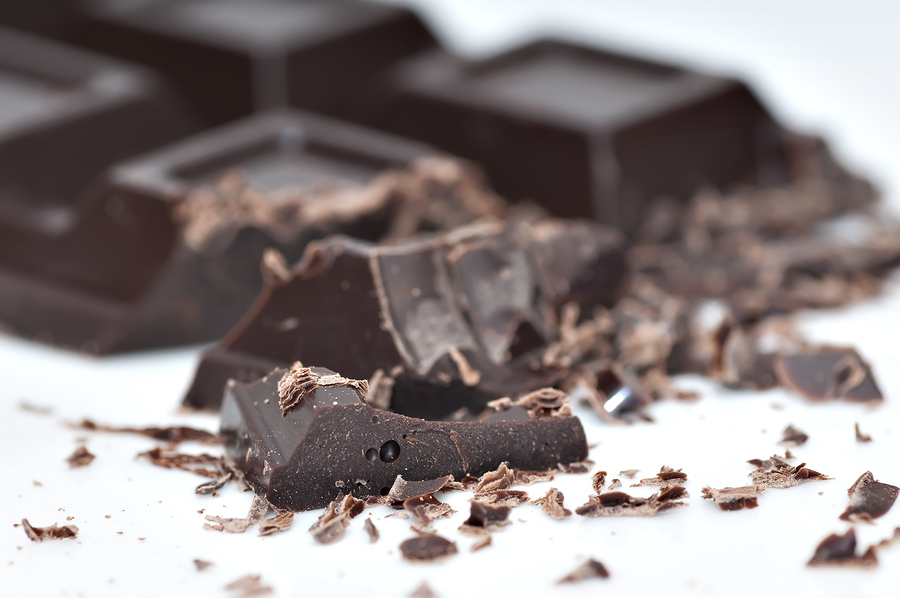 Share on Facebook
Share on Facebook

Throughout its history, which dates back at least 4,000 years, chocolate has been a symbol of luxury, wealth and power. During the 14th century, the Aztecs and Maya even used cacao beans as currency. Modern research has also revealed chocolate has significant health benefits — provided you’re willing to give up the now-familiar sweetness of modern day milk chocolate.
Its cacao content — which is bitter, not sweet — the amount of sugar added, and the processing chocolate undergoes, makes a huge difference in terms of whether it has any health benefits. Raw cacao gets its bitter taste from the polyphenols present, and these plant compounds are also responsible for most of the health benefits associated with dark chocolate. Milk chocolate, on the other hand, has few, if any, redeeming qualities, as it is loaded with sugar, containing very low amounts of flavonol-rich cacao.
Cocoa Contains Hundreds of Health Promoting Chemicals
The cacao bean contains hundreds of naturally occurring compounds with known health benefits, including epicatechin (a flavonoid) and resveratrol, the former of which has both antioxidant and anti-inflammatory properties, and is thought to help shield your nerve cells from damage.
Norman Hollenberg, a professor of medicine at Harvard who has spent years studying the Kuna people of Panama who consume up to 40 cups of cocoa a week, believes epicatechin is so important it should be considered a vitamin. The Kuna have less than a 10 percent risk of stroke, heart failure, cancer and diabetes, which are the most prevalent diseases ravaging the Western world. Kuna elders also have very low rates of high blood pressure, a feature attributed to their high cocoa consumption.
Resveratrol, a potent sirtuin activator, is known for its neuroprotective effects and has been linked in many recent studies to work synergistically with NAD to increase longevity. It has the ability to cross your blood-brain barrier, which allows it to moderate inflammation in your central nervous system (CNS). This is significant because CNS inflammation plays an important role in the development of neurodegenerative diseases.
Research also shows resveratrol is an exercise mimetic, producing similar mitochondrial benefits as exercise by stimulating AMPK and PKC-1alpha, which increase mitochondrial biogenesis and mitophagy. Another compound found in cacao is phenylethylamine, which has been shown to boost mood in a way similar to that of tryptophan, which your body converts to serotonin.
Theobromine, meanwhile, has effects similar to that of caffeine, but without the jitteriness. Cacao is also rich in important minerals such as magnesium, which promotes muscle relaxation and is needed for bone health, iron for red blood cell production, and zinc, needed for cell renewal.
Just be careful and avoid the mistake I made. I assumed since cacao is so wonderful you can take it every day without a break. I used raw cacao nibs in my smoothie for the better part of a year and developed a sensitivity to it. It is best to take a few days off a week so you don’t develop a sensitivity.
Dark Chocolate Supports Brain Health
Most recently, human trial data from Loma Linda University, presented at the Experimental Biology 2018 annual meeting in San Diego, reveal chocolate helps improve stress levels, inflammation, mood, memory and immune function. The caveat? It has to contain at least 70 percent cacao and be sweetened with organic cane sugar. According to Loma Linda University:
“While it is well-known that cacao is a major source of flavonoids, this is the first time the effect has been studied in human subjects to determine how it can support cognitive, endocrine and cardiovascular health … These studies show us that the higher the concentration of cacao, the more positive the impact on cognition, memory, mood, immunity and other beneficial effects.”
In the first study, 70 percent cacao chocolate consumption was associated with upregulation of several intracellular signaling pathways that are involved in the activation of T-cells, the cellular immune response, and genes involved in the signaling between brain cells and sensory perception. In other words, not only was it found to improve immune function, but dark chocolate may also boost brain plasticity, improving your ability to learn, process and remember new information.
https://www.healthnutnews.com/this-treat-improves-inflammation-mood-and-memory-but-only-if-its-the-right-kind/


